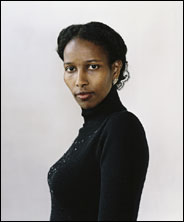The article is essentially a straightforward piece of reporting on Hirsi Ali's life, politics, and handling of death threats, and I think it only touches on the heart of the tale, which is the powerful, compassionate, and fiercely beating heart of its subject. Her steely-eyed stare and ability to smile and charm through a time of torment during a recent "60 Minutes" interview made Hirsi Ali a great deal more enthralling than Christopher Caldwell's piece. Hirsi Ali is a strking woman, in appearance, tone, and words, and to practically ignore this power is to misrepresent the person. The attached picture proves this point.

Also, I would've liked less discussion of Holland and more placement of Ali's thoughts and politics into the international sphere, where they belong. Reading the article I couldn't help thinking about Canada's Irshad Manji, ex-Muslim and author of "The Trouble with Islam." Both have started a firestorm in their homeland and have the Muslim diaspora debating change and modernity and fundamentalism and jihad.
I wonder why I can look across the Western world and find no Muslim men taking a similarly vocal, tough, and transgressive stance. Where is the Martin Luther of Islam? Why have so few Muslim men stood up and attacked their faulty faith? Perhaps because female oppression within Islam -- genital mutilation, male bigamy, lack of social worth, public hiding and shame -- has bred a bolder strain. Suffering is often the midwife to courage and insight, and these two women would seem to be prime examples.
But that seems too simplistic a reason. For Hirsi Ali and Manji are keenly aware of their task, which is less about a clash of civilizations than a bridging of three cleavages: that between Islam and its new home, the West; that between moderate and fundamentalist Muslims; and that between men and women within the faith.
I'm thankful for their courage and their faith in the human capacity for change, but my guess is we will begin to see a real Islamic transformation when prominent Muslim men finally point the finger at their oft-misguided brethren.
No comments:
Post a Comment